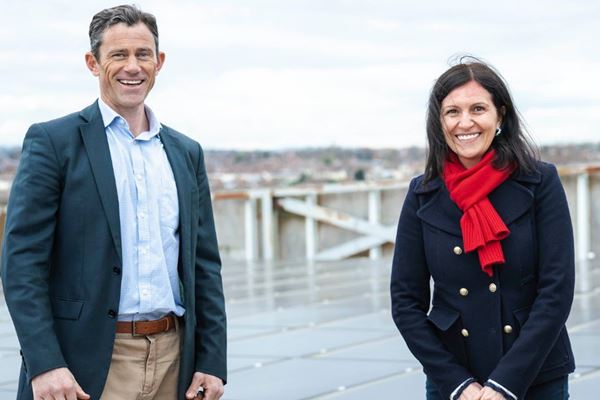A recent report by the International Institute for Sustainable Development (IISD) has confirmed that there are no possible pathways in which the world can invest in new oil and gas fields at the same as limiting global warming to 1.5c. In short, we won’t achieve net zero if we continue to invest in fossil fuels.
The same report found that if we redirected the annual $570 billion spent on ramping up fossil fuel production worldwide, we could more than compensate for the $450bn shortfall in solar and wind investment required to meet global climate goals.
With gas prices soaring and consumers struggling to pay their bills, there is no doubt that COP is more relevant than ever this year. The huge economic problems countries are currently experiencing are driven by their reliance on expensive imported fossil fuels. Sustainable economic recovery and managing climate change are two sides of the same coin.
Ahead of COP, the Department for Business, Energy and Industrial Strategy (BEIS) commissioned an independent review of the government’s approach to delivering net zero, with a focus on ensuring it’s done in a way that is ‘pro-business’ and ‘pro-growth’. We believe that delivering net zero is inherently pro-business and pro-growth, as the UK takes this opportunity to create a better, fairer world based on abundant natural resources.
As a business that is actively funding and building clean energy projects in the UK, it’s important that we’re part of these conversations and that the government understands how it can support investment across the renewables mix moving forwards. Below, we highlight the key areas which we believe will accelerate net zero, lower bills and create new green jobs.
WHAT WE WANT FROM THE NET ZERO REVIEW
1. SUSTAINABLE ECONOMIC GROWTH IS BORN FROM NET ZERO
We want the government to acknowledge the economic benefits that come from our transition to a renewables-based energy system.
Net zero provides a massive opportunity for the UK to have a positive impact for all via energy cost savings and investment in long-term, clean energy infrastructure. It will create not just new jobs but new green career paths, as well as the homegrown energy sources the country so badly needs for both energy security and economic prosperity. It also has the potential to create a new industry as the UK can export its net zero services, products, and investment overseas.
Our offshore wind industry leads the world and is therefore presenting opportunities for other UK businesses to get involved with the supply chain. Onshore wind and solar, carefully sited and embedded in communities, have the potential to do the same.
The UK’s legally binding net zero targets present an opportunity for us to fulfil our mission to power the transition to a sustainable energy future by helping people meaningfully connect with clean energy projects. We believe these targets are the catalyst the country needs to underpin economic growth, promote energy independence and tackle the energy crisis, which is driven by our reliance on volatile, expensive fossil fuels like gas.
2. A MORE FAVOURABLE APPROACH TO ONSHORE WIND
As one of the cheapest and quickest technologies to deploy, we have a ready-to-go solution that is not being fully utilised. An effective ban on onshore wind in England – introduced in 2015 – has led to a significant slowdown in the number of new projects being deployed. Moving forwards, we hope that the additional planning barriers will be reversed so that onshore wind is treated in line with other infrastructure projects when it comes to planning, allowing us to crack on with building projects that deliver savings back to consumers.
Facilitating the repowering of existing onshore wind turbines would also be a material win in terms of unlocking the potential of onshore wind. Repowering has the potential to increase UK generation significantly, as more modern machines can deliver much more electricity per site compared to older models. For example, we repowered our Caton Moor wind farm in 2006, replacing the existing 10 turbines with 8 more advanced machines. With two fewer turbines and only a small increase in the size of each, output from the site was increased seven-fold.
Most renewable generation equipment requires re-powering 20 or 30 years after commissioning. As the UK’s fleet matures, it is crucial to remove uncertainty from the planning process so that we can plan and deliver repowering in a cost-effective way.
3. ELECTRICITY STORAGE CAN HELP MAINTAIN ENERGY SECURITY WHILE ALSO ACCELERATING NET ZERO
We think the value of storage solutions should be recognised, not only in accelerating net zero, but in the avoided costs of transmission and distribution infrastructure. To reap the rewards of long-term sustainable storage – including aggregated BESS, pumped hydro storage and emerging storage technologies – we need clear, long term price signals that encourage investment and therefore delivery. With greater clarity, we can flatten demand, reduce the amount of capacity, distribution and transmission infrastructure, and therefore ultimately lower the cost of electricity for everyone.
POST COP27 AND BEYOND
It’s great to see the government acknowledging the role renewables have to play, not only in delivering net zero but in lowering energy costs for consumers. While this is positive, the most important thing the government could do to accelerate our transition is to provide a more supportive, stable policy environment. This would allow the renewables sector to make long-term investment decisions with confidence, accelerating and lowering the cost of delivering the fleet of renewables required for a clean, sustainable future.
It is also essential that businesses, communities and individuals are given the tools to become more self-sufficient in energy. This means moving from the old model, where large power stations fed passive consumers, to renewable electricity and heat generation, combined with time of use incentives and improved energy efficiency, that support smart, local grids.
Delivering on net zero by 2050 and ending the energy crisis go hand in hand. Only by building new clean energy and storage projects can we secure a long-term, low cost, reliable electricity supply for the UK. This is, of course, also the route to net zero. What we need from our government is certainty – it’s time for smart, sustainable policies that deliver value as part of a just transition.



